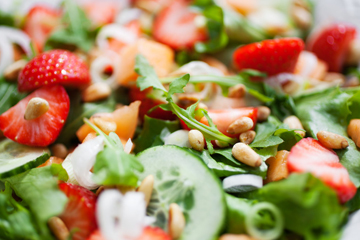Summer is here and you need to take steps to protect your skin as you step out into the sun. Wearing a wide-brimmed hat and sunglasses and staying under a sun umbrella while you’re at the beach is important. Another key strategy to protect yourself from the effects of ultraviolet radiation which can cause skin cancer is to focus on your diet. Researchers say that dietary antioxidants can help prevent damage to DNA and cancerous growths that can result from UV radiation.
Skin cancer is the most common cancer found in the United States. The disease is characterized by abnormal cancerous growths in the skin cells caused by exposure to UV radiation that generate free radicals that produce inflammation and damage cell function and the skin’s DNA. Reports say foods rich in certain nutrients can help. The Skin Cancer Foundation points out that “studies have shown that substances called antioxidants, including vitamins and other nutrients, may help fight off free radicals and prevent the damage they do that can cause skin cancer. So, it makes sense that replacing these protective substances could bolster the weakened defenses.”
Experts say that including the following foods in your diet in summer can help avoid skin cancer:
For Breakfast
Breakfast is the most important meal that should not be skipped. There should be clear knowledge on what we eat during this time. As having unhealthy breakfast foods such as bagels, toast, croissants, muffins, and other carb-loaded breakfast items can only harm your health. This is because these high glycemic index foods are loaded with oil, sugar, and other saturated fats that harm the skin cells. Replace them with healthier foods such as oats, yogurt, and coffee that are low-GI (glycemic index).
- Oatmeal is rich in antioxidants and also helps undo skin damage caused by pollution, UV rays and chemicals.
- The consumption of coffee might be beneficial in fighting skin cancer, as coffee is rich in antioxidants that help to fight free radical damage.
- Consuming probiotics which is found in plain yogurt boosts the good bacteria found in our body, which may help protect against skin cancer. According to the article, “Some strains of probiotics have been shown to protect the skin from UV damage, and other strains have been shown to repair the skin from damage already done by the sun.” Experts recommend making yogurt a crucial part of your diet and consume it on regular basis especially in summer.
For Lunch
- Researchers say a plant-based Mediterranean diet can protect against skin cancer. So a salad with a base of dark green leafy vegetables is a good choice. Leafy greens such as spinach, mint leaves, asparagus are extremely rich in nutrients and antioxidants. They can protect skin from damage and help repair the skin too.
- Tomatoes are another antioxidant that can protect the skin from harsh skin rays. The ycopene and phytochemicals found in tomatos can help prevent the UV rays from the sun penetrating the skin and act as protection against skin cancer.
- You can finish your lunch with nuts such as almonds, cashews, walnuts and so on. Nuts are extremely nutritious as they contain vitamins, protein, minerals and omega-3 fatty acids which acts as a protective barrier between the skin cells and the UV rays from the sun, thus preventing damage.
Snacks
- Carrots are beta carotene vegetable that can be consumed as a snack. Beta carotene rich fruits and vegetables have health benefits that can reduce the risk of some cancers, including skin cancer according to a Reader’s Digest article.
- Drinking green tea or black tea can prevent skin cancer, say studies. The polyphenols, flavonoids, and catechins found in green tea help repair damaged skin and restore elasticity.
Dinner
- For dinner include salmon, broccoli, and dark chocolate. Salmon is rich in omega-3 fatty acids that can reduce the risk of skin cancer.
- For dessert, choose fresh fruit such as pomegranate, strawberries, grape, watermelon, mango and cherries.
Avoid a high diet in meat and fat as it can increase the risk of squamous skin cancer (SCC) tumors. Use skin cancer-fighting turmeric as a seasoning. A study from the University of Texas MD Anderson Cancer Center reported that turmeric is a natural anti-inflammatory and contains active compounds called curcuminoids, which have many cell-protective properties. Turmeric can provide protection against not only cancer but also other inflammatory illnesses, say the researchers.
